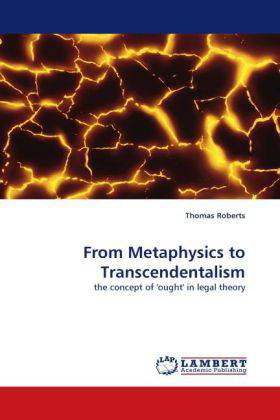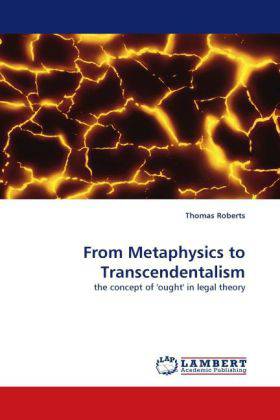
- Afhalen na 1 uur in een winkel met voorraad
- Gratis thuislevering in België vanaf € 30
- Ruim aanbod met 7 miljoen producten
- Afhalen na 1 uur in een winkel met voorraad
- Gratis thuislevering in België vanaf € 30
- Ruim aanbod met 7 miljoen producten
Zoeken
From Metaphysics to Transcendentalism
the concept of 'ought' in legal theory
Thomas Roberts
Paperback | Engels
€ 77,95
+ 155 punten
Omschrijving
The foundation stone for any theory of law is a concept of 'ought'. This concept is at present under- theorised, and where it is considered, it is largely assumed that an ought is generated out of an act of will on the part of the rule maker. A study of existing theories, and in particular positivism, shows that despite attempts to distance the concept of rule from volition, the theoretical edifice of rules is nonetheless premised on intention and the will. This study then sets out to de-construct the theoretical view that grants volition a role in the creation of meaning in general, and normativity more specifically, drawing heavily on Derrida's works. It then argues that efforts at reconstruction must start from an ontological basis, in particular from a study of the characteristics of the self when a person is subject to a rule. Adopting a transcendental approach inspired by Kant and Heidegger, the book concludes with a series of claims about what necessary characteristics the self must display, and what necessary characteristics the social environment must be regarded as having, in order for rule creation, understanding and obedience to be possible at all.
Specificaties
Betrokkenen
- Auteur(s):
- Uitgeverij:
Inhoud
- Aantal bladzijden:
- 408
- Taal:
- Engels
Eigenschappen
- Productcode (EAN):
- 9783838351018
- Verschijningsdatum:
- 27/10/2010
- Uitvoering:
- Paperback
- Formaat:
- Trade paperback (VS)
- Afmetingen:
- 152 mm x 229 mm
- Gewicht:
- 594 g

Alleen bij Standaard Boekhandel
+ 155 punten op je klantenkaart van Standaard Boekhandel
Beoordelingen
We publiceren alleen reviews die voldoen aan de voorwaarden voor reviews. Bekijk onze voorwaarden voor reviews.











